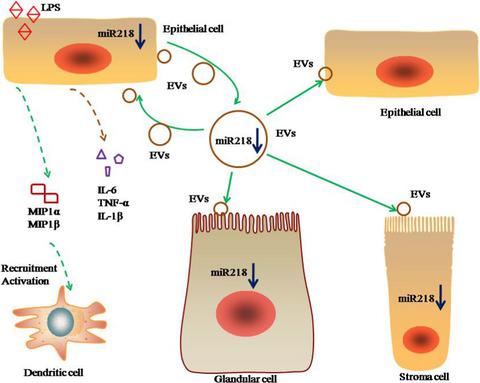当前位置:
X-MOL 学术
›
Microb. Biotechnol.
›
论文详情
Our official English website, www.x-mol.net, welcomes your
feedback! (Note: you will need to create a separate account there.)
Exosome-derived uterine miR-218 isolated from cows with endometritis regulates the release of cytokines and chemokines.
Microbial Biotechnology ( IF 4.8 ) Pub Date : 2020-03-30 , DOI: 10.1111/1751-7915.13565 Xiangguo Wang 1 , Xinxin Yao 1 , Tongtong Xie 1 , Zhenyu Chang 1 , Yong Guo 1 , Hemin Ni 1
Microbial Biotechnology ( IF 4.8 ) Pub Date : 2020-03-30 , DOI: 10.1111/1751-7915.13565 Xiangguo Wang 1 , Xinxin Yao 1 , Tongtong Xie 1 , Zhenyu Chang 1 , Yong Guo 1 , Hemin Ni 1
Affiliation

|
As an inflammation of the endometrium, endometritis can affect fertility and lead to serious economic losses in the dairy industry. Widely found in various tissues and body fluids, exosomes and exosome micro (mi)RNAs have been shown to play an important regulatory role in the immune responses. As one of differentially expressed exosome miRNAs, miR‐218 is involved in the pathogenesis of bovine endometritis. The mechanisms of miR‐218 in regulating the release of cytokines and chemokines in endometritis, however, are poorly understood. Exosomes were isolated from bovine uterine cavity fluid and verified by transmission electron microscopy. An in vitro lipopolysaccharide‐treated cell model for bovine endometritis was then established to evaluate the correlation between exosome‐derived miR‐218 and the immune responses. We demonstrated that exosomes could be used to deliver miR‐218 from endometrial epithelial cells (EECs) into the uterine microenvironment and adjacent recipient cells to modulate local immune responses. miR‐218 packaged in the exosomes secreted from EECs acts as an inhibitor by blocking immune factors such as interleukin (IL)‐6, IL‐1β, tumour necrosis factor‐α, the chemokines macrophage inflammatory genes (MIP)‐1α and MIP‐1β to maintain the immune balance in the uterus. However, uterine inflammation altered the immunoregulatory mechanism of exosome miR‐218. MiR‐218 is a potential biomarker for the detection of endometritis. Our findings also revealed a new mechanism for the development of endometritis in cows.
中文翻译:

从患有子宫内膜炎的奶牛中分离出的外泌体来源的子宫 miR-218 可调节细胞因子和趋化因子的释放。
作为子宫内膜的炎症,子宫内膜炎会影响生育能力并导致乳制品行业严重的经济损失。外泌体和外泌体 micro (mi)RNA 广泛存在于各种组织和体液中,已被证明在免疫反应中发挥重要的调节作用。 miR-218作为差异表达的外泌体miRNA之一,参与牛子宫内膜炎的发病机制。然而,人们对 miR-218 调节子宫内膜炎细胞因子和趋化因子释放的机制知之甚少。从牛子宫腔液中分离出外泌体,并通过透射电子显微镜进行验证。然后建立了体外脂多糖处理的牛子宫内膜炎细胞模型,以评估外泌体衍生的 miR-218 与免疫反应之间的相关性。我们证明,外泌体可用于将 miR-218 从子宫内膜上皮细胞 (EEC) 递送到子宫微环境和邻近的受体细胞中,以调节局部免疫反应。包装在 EEC 分泌的外泌体中的 miR-218 通过阻断白细胞介素 (IL)-6、IL-1β、肿瘤坏死因子-α、趋化因子巨噬细胞炎症基因(MIP)-1α和MIP-等免疫因子发挥抑制剂作用。 1β维持子宫内的免疫平衡。然而,子宫炎症改变了外泌体 miR-218 的免疫调节机制。 MiR-218 是检测子宫内膜炎的潜在生物标志物。我们的研究结果还揭示了奶牛子宫内膜炎发生的新机制。
更新日期:2020-03-30
中文翻译:

从患有子宫内膜炎的奶牛中分离出的外泌体来源的子宫 miR-218 可调节细胞因子和趋化因子的释放。
作为子宫内膜的炎症,子宫内膜炎会影响生育能力并导致乳制品行业严重的经济损失。外泌体和外泌体 micro (mi)RNA 广泛存在于各种组织和体液中,已被证明在免疫反应中发挥重要的调节作用。 miR-218作为差异表达的外泌体miRNA之一,参与牛子宫内膜炎的发病机制。然而,人们对 miR-218 调节子宫内膜炎细胞因子和趋化因子释放的机制知之甚少。从牛子宫腔液中分离出外泌体,并通过透射电子显微镜进行验证。然后建立了体外脂多糖处理的牛子宫内膜炎细胞模型,以评估外泌体衍生的 miR-218 与免疫反应之间的相关性。我们证明,外泌体可用于将 miR-218 从子宫内膜上皮细胞 (EEC) 递送到子宫微环境和邻近的受体细胞中,以调节局部免疫反应。包装在 EEC 分泌的外泌体中的 miR-218 通过阻断白细胞介素 (IL)-6、IL-1β、肿瘤坏死因子-α、趋化因子巨噬细胞炎症基因(MIP)-1α和MIP-等免疫因子发挥抑制剂作用。 1β维持子宫内的免疫平衡。然而,子宫炎症改变了外泌体 miR-218 的免疫调节机制。 MiR-218 是检测子宫内膜炎的潜在生物标志物。我们的研究结果还揭示了奶牛子宫内膜炎发生的新机制。











































 京公网安备 11010802027423号
京公网安备 11010802027423号